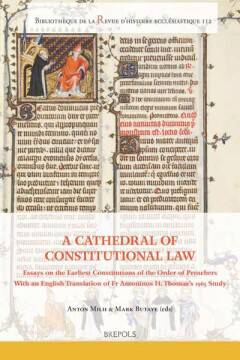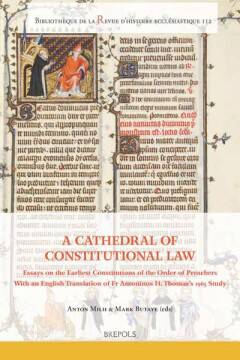
Bedankt voor het vertrouwen het afgelopen jaar! Om jou te bedanken bieden we GRATIS verzending (in België) aan op alles gedurende de hele maand januari.
- Afhalen na 1 uur in een winkel met voorraad
- In januari gratis thuislevering in België
- Ruim aanbod met 7 miljoen producten
Bedankt voor het vertrouwen het afgelopen jaar! Om jou te bedanken bieden we GRATIS verzending (in België) aan op alles gedurende de hele maand januari.
- Afhalen na 1 uur in een winkel met voorraad
- In januari gratis thuislevering in België
- Ruim aanbod met 7 miljoen producten
Zoeken
Omschrijving
In 1965, the Belgian Dominican friar Antoninus Hendrik Thomas published a critical reconstruction of the oldest Constitutions of the Dominican Order. Meticulously he pointed out where Saint Dominic and his first brothers had borrowed material from other religious and secular juridical systems, as well as where they had been original, thus uncovering the foundational charism of the Order. Until today, Fr. Thomas' work is considered by researchers in the field as unmissable. Unfortunately, many of his insights are difficult to access by a wider audience, since Fr. Thomas wrote his work in his native language, Dutch. To celebrate the eighth centenary of the death of Saint Dominic in 2021, the Belgian Dominican province has therefore decided to publish Fr. Thomas' work in an English translation, as well as to complement this with a volume of essays written by contemporary experts, who - from their particular perspectives - interact with Fr. Thomas' main insights. The essays deal with the historiographical tradition to which Fr. Thomas belonged, the Premonstratensian, Cistercian and secular sources of the Constitutions, the manuscript tradition, editing process and the internal logic of the oldest Constitutions, and their reception in the first century of the Order and by the late medieval observant movement.
Specificaties
Betrokkenen
- Auteur(s):
- Vertaler(s):
- Uitgeverij:
Inhoud
- Aantal bladzijden:
- 508
- Taal:
- Frans
Eigenschappen
- Productcode (EAN):
- 9782503593340
- Verschijningsdatum:
- 4/12/2023
- Uitvoering:
- Paperback
- Formaat:
- Trade paperback (VS)
- Gewicht:
- 93793 g

Alleen bij Standaard Boekhandel
+ 262 punten op je klantenkaart van Standaard Boekhandel
Beoordelingen
We publiceren alleen reviews die voldoen aan de voorwaarden voor reviews. Bekijk onze voorwaarden voor reviews.









